VW Golf VS Ford Kuga – Specs, Efficiency & Price Comparison
Which model is the better choice – the VW Golf or the Ford Kuga? We compare performance (333 HP vs 243 HP), boot capacity (381 L vs 412 L), efficiency (0.30 L vs 0.90 L), and of course, the price (24300 £ vs 34200 £).
Find out now which car fits your needs better!
The VW Golf (Hatchback) is powered by a Petrol MHEV, Petrol, Diesel or Plugin Hybrid engine and comes with a Automatic or Manuel transmission. In comparison, the Ford Kuga (SUV) features a Petrol, Full Hybrid or Plugin Hybrid engine and a Manuel or Automatic gearbox.
When it comes to boot capacity, the VW Golf offers 381 L, while the Ford Kuga provides 412 L – depending on what matters most to you. If you’re looking for more power, you’ll need to decide whether the 333 HP of the VW Golf or the 243 HP of the Ford Kuga suits your needs better.
There are also differences in efficiency: 0.30 L vs 0.90 L. In terms of price, the VW Golf starts at 24300 £, while the Ford Kuga is available from 34200 £.
Compare all the key specs now and find out which model fits your lifestyle best!
VW Golf
Der VW Golf überzeugt seit Jahrzehnten durch seine Vielseitigkeit und seine ausgewogene Mischung aus Komfort und Dynamik. Mit seinem zeitlosen Design und der hochwertigen Verarbeitung ist er ein treuer Begleiter im Alltag. Besonders beliebt ist der Golf wegen seiner innovativen Technologie und der großen Auswahl an Varianten, die für jeden Bedarf das passende Modell bietet.
details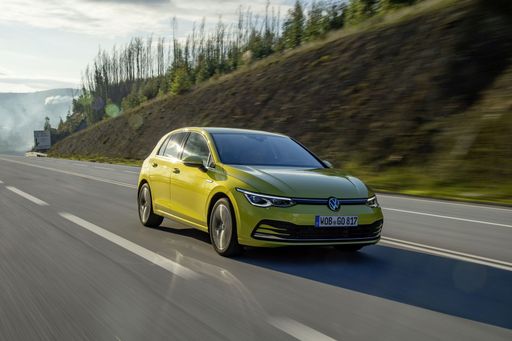 @ Volkswagen
@ Volkswagen
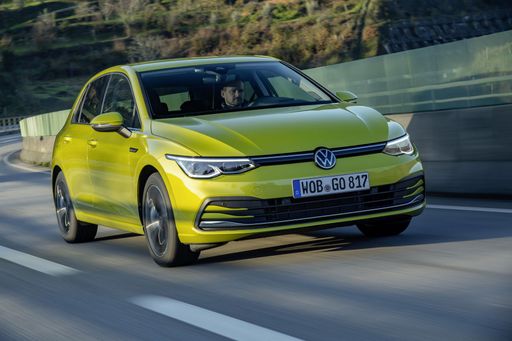 @ Volkswagen
@ Volkswagen
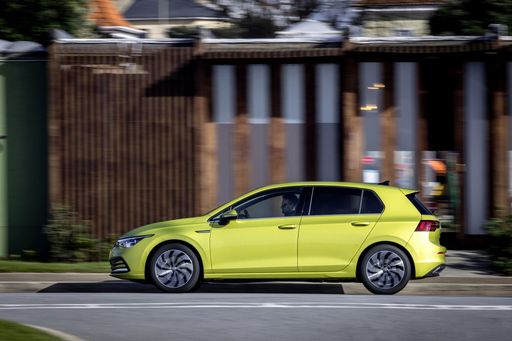 @ Volkswagen
@ Volkswagen
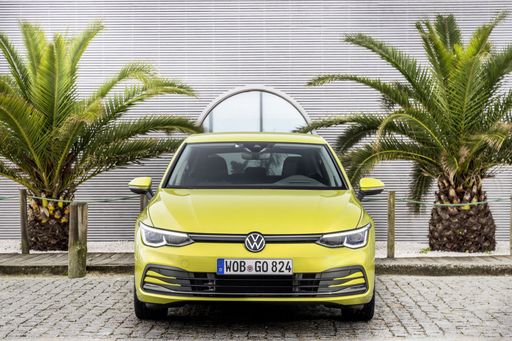 @ Volkswagen
@ Volkswagen
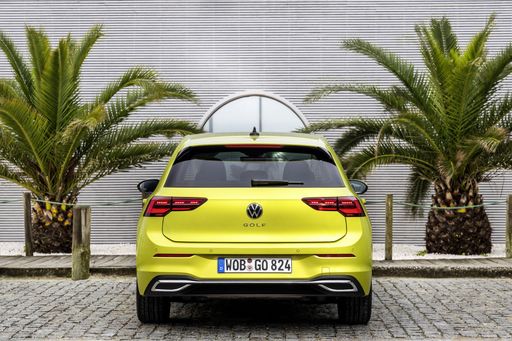 @ Volkswagen
@ Volkswagen
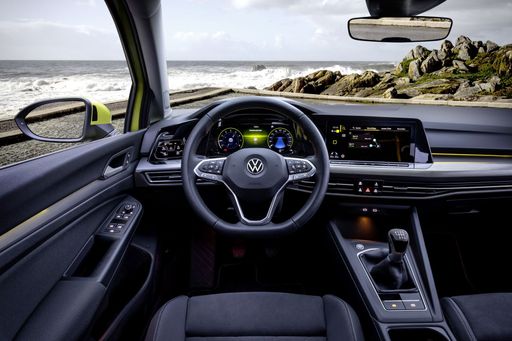 @ Volkswagen
@ Volkswagen
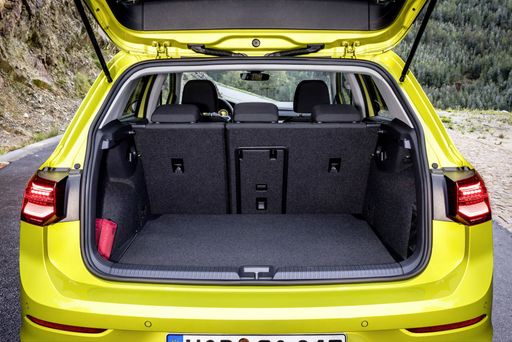 @ Volkswagen
@ Volkswagen
Ford Kuga
The Ford Kuga stands out in the realm of compact SUVs with its sleek design and dynamic performance capabilities. Its spacious interior is thoughtfully designed to provide comfort and practicality for both driver and passengers, making it an ideal choice for families and adventurers alike. Advanced technology and safety features further enhance the driving experience, ensuring a seamless blend of innovation and reliability on the road.
details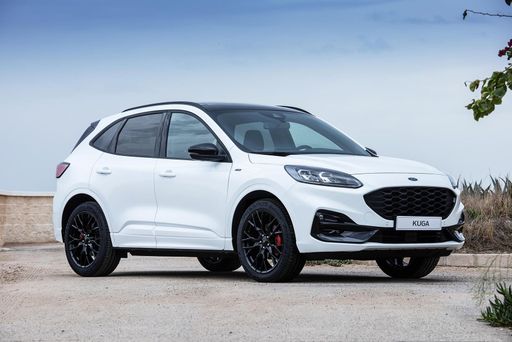 @ kuga.fordpresskits.com
@ kuga.fordpresskits.com
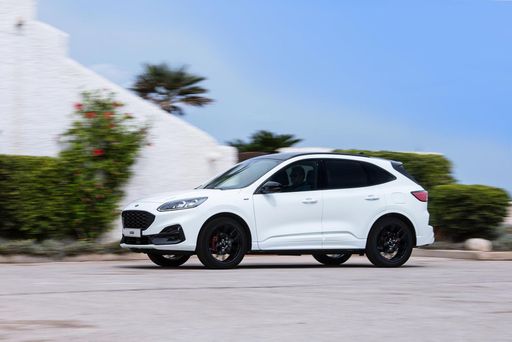 @ kuga.fordpresskits.com
@ kuga.fordpresskits.com
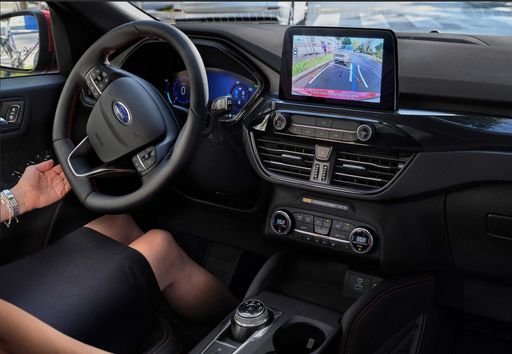 @ kuga.fordpresskits.com
@ kuga.fordpresskits.com

|

|
|
|
|
Costs and Consumption |
|
|---|---|
|
Price
24300 - 51100 £
|
Price
34200 - 45000 £
|
|
Consumption L/100km
0.3 - 8.5 L
|
Consumption L/100km
0.9 - 6.4 L
|
|
Consumption kWh/100km
-
|
Consumption kWh/100km
-
|
|
Electric Range
131 - 143 km
|
Electric Range
69 km
|
|
Battery Capacity
19.70 kWh
|
Battery Capacity
1.1 - 14.4 kWh
|
|
co2
6 - 192 g/km
|
co2
20 - 145 g/km
|
|
Fuel tank capacity
40 - 50 L
|
Fuel tank capacity
42 - 54 L
|
Dimensions and Body |
|
|---|---|
|
Body Type
Hatchback
|
Body Type
SUV
|
|
Seats
5
|
Seats
5
|
|
Doors
5
|
Doors
5
|
|
Curb weight
1304 - 1670 kg
|
Curb weight
1526 - 1859 kg
|
|
Trunk capacity
273 - 381 L
|
Trunk capacity
412 L
|
|
Length
4282 - 4292 mm
|
Length
4604 - 4645 mm
|
|
Width
1789 mm
|
Width
1882 mm
|
|
Height
1456 - 1483 mm
|
Height
1673 - 1681 mm
|
|
Payload
428 - 505 kg
|
Payload
541 - 550 kg
|
Engine and Performance |
|
|---|---|
|
Engine Type
Petrol MHEV, Petrol, Diesel, Plugin Hybrid
|
Engine Type
Petrol, Full Hybrid, Plugin Hybrid
|
|
Transmission
Automatic, Manuel
|
Transmission
Manuel, Automatic
|
|
Transmission Detail
Dual-Clutch Automatic, Manual Gearbox
|
Transmission Detail
Manual Gearbox, CVT
|
|
Drive Type
Front-Wheel Drive, All-Wheel Drive
|
Drive Type
Front-Wheel Drive, All-Wheel Drive
|
|
Power HP
116 - 333 HP
|
Power HP
150 - 243 HP
|
|
Acceleration 0-100km/h
4.6 - 10.2 s
|
Acceleration 0-100km/h
7.3 - 9.5 s
|
|
Max Speed
202 - 270 km/h
|
Max Speed
195 - 200 km/h
|
|
Torque
220 - 420 Nm
|
Torque
240 Nm
|
|
Number of Cylinders
4
|
Number of Cylinders
3 - 4
|
|
Power kW
85 - 245 kW
|
Power kW
110 - 178 kW
|
|
Engine capacity
1498 - 1984 cm3
|
Engine capacity
1497 - 2488 cm3
|
General |
|
|---|---|
|
Model Year
2024
|
Model Year
2024
|
|
CO2 Efficiency Class
D, C, B, F, G
|
CO2 Efficiency Class
E, D, B
|
|
Brand
VW
|
Brand
Ford
|
VW Golf
VW Golf: Ein Evergreen mit innovativer Technik
Seit Jahrzehnten gilt der Volkswagen Golf als der Inbegriff des zuverlässigen Kompaktwagens. Doch der neueste VW Golf zeigt sich nicht nur als bewährter Alltagsheld, sondern auch als Fortführer technologischer Innovationen. Ob Benzin, Diesel oder Hybrid – der Golf bietet für jede Präferenz die passende Antriebsform und bleibt dabei stets am Puls der Zeit.
Antriebsvarianten: Vielfalt für jeden Fahrertyp
Der VW Golf ist in einer beeindruckenden Bandbreite von Antriebsvarianten erhältlich, die von klassischen Benzinmotoren über effiziente Diesel-Aggregate bis hin zu modernen Hybrid-Antrieben reichen. Insbesondere die Mild-Hybrid und Plug-In-Hybrid Modelle stellen einen herausragenden Fortschritt in Sachen Kraftstoffeffizienz und CO2-Reduktion dar. Mit einem Verbrauch von nur 0,3 L/100 km bei den Plug-In-Hybrid Varianten und einer elektrischen Reichweite von bis zu 137 km setzt der Golf Maßstäbe in seiner Klasse.
Leistung und Effizienz
Das Leistungsspektrum des Golf erstreckt sich von effizienten 116 PS bis hin zu kraftvollen 333 PS im Golf R, der mit Allradantrieb und sportlicher Dynamik beeindruckt. Vielfältige Auswahlmöglichkeiten bei Getriebearten, von manuell bis zum modernen Doppelkupplungsgetriebe (DSG), bieten zusätzliche Flexibilität für unterschiedliche Fahrstile und Nutzungsszenarien.
Technologie und Innovation
Die neuesten Golf-Modelle sind mit fortschrittlicher Technologie ausgestattet, die Komfort und Sicherheit auf ein neues Niveau hebt. Das Interieur glänzt mit einem modernen Infotainmentsystem, umfassender Konnektivität und innovativen Fahrerassistenzsystemen. Das Head-up-Display, adaptive Fahrwerksregelung und die intelligente Verkehrszeichenerkennung sind nur einige der Features, die den Golf zu einem der technologisch führenden Fahrzeuge in seinem Segment machen.
Design und Funktionalität
Der VW Golf kombiniert bewährtes Design mit funktionalen Verbesserungen. Das sportliche, aber dennoch elegante Schrägheck bietet großzügigen Platz, wobei der Kofferraum zwischen 273 und 381 Litern zu bieten hat. Die ästhetische Linienführung bei zugleich optimaler Raumausnutzung verleihen dem VW Golf seine typisch zeitlose Eleganz.
Umweltbewusstsein und Nachhaltigkeit
In einer Zeit, in der der bewusste Umgang mit Ressourcen immer wichtiger wird, überzeugt der Golf mit einer hohen Effizienz und geringen Emissionen. Die verfügbaren CO2-Effizienzklassen von B bis G zeigen, dass der Golf auch in puncto Umweltverträglichkeit eine gute Wahl darstellt. Dank der Auswahl an ressourcenschonenden Antrieben trägt der Golf zur Reduzierung des ökologischen Fußabdrucks bei.
Fazit: Der VW Golf bleibt ein Bestseller
Mit stetiger Weiterentwicklung in Technik und Design bleibt der VW Golf ein Dauerbrenner auf dem Automobilmarkt. Seine Vielseitigkeit in Antriebsarten, gepaart mit modernem Komfort und zukunftsweisender Technologie, macht ihn zu einem Fahrzeug, das nicht nur treue Fans begeistert, sondern auch neue Kunden anspricht. Der Golf bleibt ein Symbol für Zuverlässigkeit und Innovation in einem sich stetig wandelnden Markt.
Ford Kuga
Discovering the Ford Kuga: An SUV for the Modern Age
The Ford Kuga has established itself as a versatile and reliable choice in the competitive SUV market. Combining sleek design with innovative technology, the Kuga offers a range of options to suit different driving preferences and needs. Let’s delve into the various technical details and pioneering features that make this vehicle stand out.
Design and Construction
The Ford Kuga embodies a contemporary design ethos, with dimensions that accommodate both functionality and style. Measuring between 4604 and 4645 mm in length, the Kuga is designed to offer ample interior space while maintaining a compact exterior profile. This is complemented by a width of 1882 to 1883 mm and a height ranging from 1650 to 1681 mm, ensuring a comfortable and commanding drive on the road.
Innovative Powertrains
With a diverse array of engine configurations, the Kuga caters to both traditional and eco-conscious drivers. The range includes 1.5-litre EcoBoost petrol engines, 2.0-litre EcoBlue diesel options, as well as an innovative 2.5-litre full hybrid and plug-in hybrid variants. The hybrid models, particularly the plug-in hybrid, offer impressive efficiency with a consumption as low as 0.9 L/100 km and an electric range of up to 69 km.
Performance and Efficiency
The Kuga delivers a robust performance with power outputs ranging from 120 PS to 243 PS, ensuring there is a model to match your driving style. The vehicle accelerates from 0-100 km/h in as little as 7.3 seconds, depending on the chosen powertrain. Notably, the plug-in hybrid versions allow for considerable fuel savings, making the Kuga a cost-effective option for long-term use.
Advanced Technology and Features
Ford has integrated the latest technology into the Kuga, enhancing both comfort and safety. The vehicle features multiple driving modes tailored to different terrains, advanced driver-assistance systems, and a user-friendly infotainment system that keeps all controls within easy reach. The intelligent all-wheel-drive system available on certain models provides enhanced grip and stability in challenging conditions.
Interior Comfort and Practicality
Inside the Kuga, you'll find a spacious cabin with seating for five, designed with both comfort and utility in mind. The boot space ranges from 405 to 435 litres, allowing for an impressive amount of luggage capacity. High-quality materials and smart design choices throughout the cabin ensure a premium experience, further enhanced by options like Vignale trims for those seeking added luxury.
A Sustainable Choice
With its focus on efficiency and reduced emissions, the Ford Kuga aligns with the growing demand for environmentally responsible vehicles. The CO2 emissions range from 20 to 155 g/km, placing many models in favourable efficiency classes, thus contributing to a more sustainable future.
Conclusion
The Ford Kuga stands out in the SUV segment by offering a perfect blend of performance, technology, and sustainability. Its versatility makes it an ideal choice for diverse lifestyles, from urban adventures to rural explorations. With its innovative features and design, the Kuga is a testament to Ford’s commitment to delivering high-quality vehicles suited to today's discerning drivers.
The prices and data displayed are estimates based on German list prices and may vary by country. This information is not legally binding.
